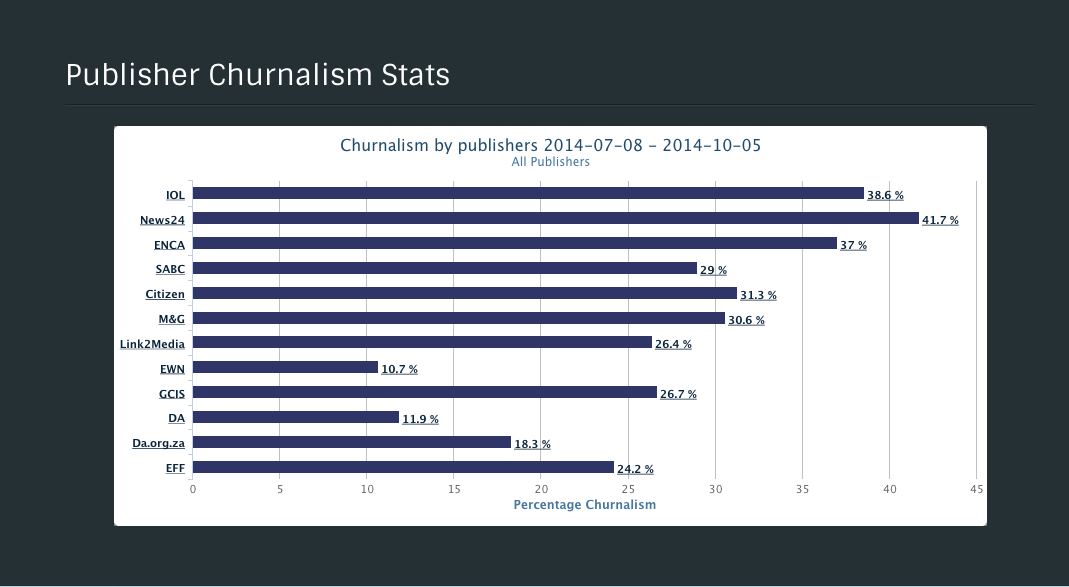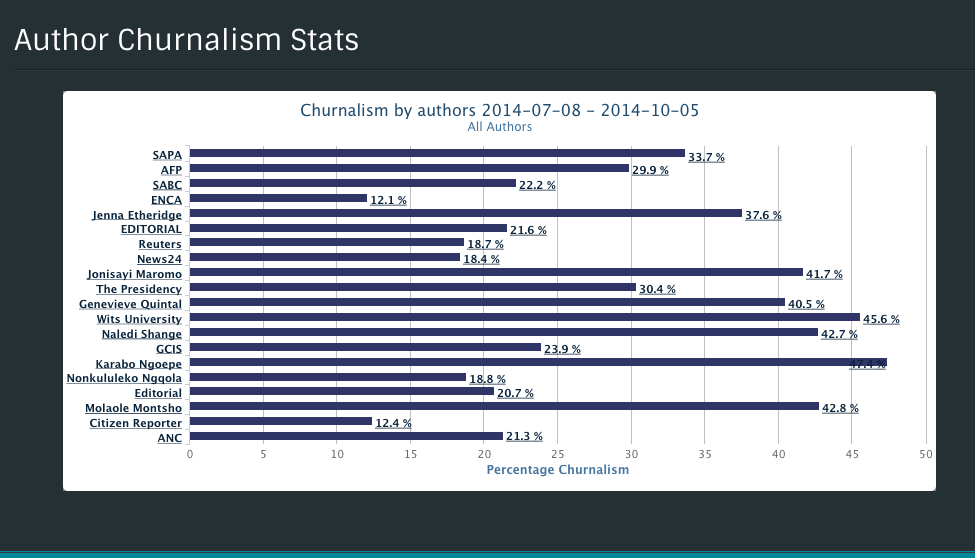When the newsrooms of the 70s changed from heavy Olivetti typewriters to whirring electric golf ball varieties, I was overjoyed and my fingers flew to greet the change. When the first Atex computer systems arrived I thought it could not get better and actually switched jobs in pursuit of the black screens with flickering green words. No pictures mind. And so the 21st Century is sheer heaven.
But how do you stay on top of it all. And as a journalist with less and less time to gather information how do you know what is reliable on the net. There are some great tools out there in the digital universe and from time to time we will help you locate it. Recently the Africa News Innovation Challenge (ANIC) and Media Monitoring Africa (MMA) joined forces to launch a site that helps you know who is most guilty of Churnalism, regurgitating content instead of telling us the news. The site is also tracking who is responsible for making unethical changes to online content without informing the public about stories that have been updated.

Graph of guilty journalists
Not only does www.newstools.co.za list the companies most guilty of Churnalism but they also finger individual journalists.
“Who are the biggest regurgitators? Which media houses produce copy instead of the news?
We wanted to know not just if Churnalism occurs, but where, and how often and by who. The charts that follow show: the degree of churn across major media houses, then churn over time and finally a look at the biggest sources of Churnalism,” states the site.

Graph of guilty journalists
The same site has a service called NewsDiffs.
“NewsDiffs South Africa is there to track changes to news content over time. With paper based systems any changes to articles had to be reprinted. These days the media have the ability to change stories almost instantly, it is critical that when they do they let their readers know what changes have been made. Any editorial on a news story that undergoes changes should be clearly marked as updated,” they say.
Their first candidate for tracking change is the Mail & Guardian.
Mapping Digital Media
Somewhere in the back of our minds is the fact that television and radio across Africa is due to switch over from broadcasting analog signals to the new digital world by next year. The ambitious Open Society Foundation’s Mapping Digital Media project examines the impact of the “digital switchover” on journalism, democracy, and freedom of expression in 56 countries.
The process is complex but we don’t have to understand the technology to know that it will make a difference to all our lives. Of course it will free up the airwaves for a greater profusion Of Radio and TV stations but it’s not all good news, says the Open Society Foundation:
“Along with opportunities for more and better services, digitization can also have negative effects. Less-commercial producers may be forced to close, smaller languages may disappear from mainstream broadcasting, news and current affairs programming may be cut back, and powerful media businesses can become even more powerful—all with severe consequences for journalism, media pluralism, and democracy.
“The Mapping Digital Media project is the most extensive investigation of today’s media landscapes… The project includes analysis, and research from around the world on how digitization is changing media output, media freedom, and citizens’ access to quality news and information.”
The Mapping Digital Media report (available here) reveals common themes across the world:
- Governments and politicians have too much influence over who owns, operates, and regulates the media.
- Many media markets are rife with monopolistic, corrupt, or untransparent practices.
- It’s not clear where many governments and other bodies get their evidence for changes or updates to laws and policies on media and communication.
- Media and journalism online offer hope of new, independent sources of information, but are also a new battleground for censorship and surveillance.
- Data about the media worldwide are still uneven, unstandardized, and unreliable, and are often proprietary rather than freely accessible.











Having read this I thought it was really enlightening.
I appreciate you taking the time and effort to put this informative article together.
I once again find myself personally spending a lot of time both
reading and leaving comments. But so what, it was still worth it!
Oh my goodness! Incredible article dude! Thank you, However I am experiencing troubles with your RSS.
I don’t understand the reason why I cannot join it. Is there anybody else getting
the same RSS problems? Anyone that knows the answer can you kindly
respond? Thanx!!
Fastidious answer back in return of this question with genuine arguments
and describing the whole thing concerning that.
I would like to thank you for the efforts you
have put in penning this website. I’m hoping to see the same high-grade blog posts from you later on as well.
In truth, your creative writing abilities has encouraged me to get my own blog now 😉
I got this web page from my pal who told me regarding this site and at the moment
this time I am browsing this website and reading very informative posts at this place.
Hi, I do think this is an excellent site. I stumbledupon it 😉 I will return yet again since i have bookmarked it.
Money and freedom is the best way to change, may you be rich and continue to guide others.
I know this if off topic but I’m looking into starting my own weblog and was wondering what all
is required to get setup? I’m assuming having a blog like
yours would cost a pretty penny? I’m not very web smart so I’m
not 100% sure. Any recommendations or advice would
be greatly appreciated. Appreciate it
It’s amazing designed for me to have a web page, which is beneficial
for my knowledge. thanks admin
It’s genuinely very complex in this full of activity life to listen news
on Television, so I just use world wide web for that reason, and obtain the newest news.
Its like you read my mind! You seem to know so much about this,
like you wrote the book in it or something. I think that you can do with a few pics to drive the message home a little
bit, but instead of that, this is magnificent blog. An excellent read.
I will definitely be back.
CBD exceeded my expectations in every way thanks. I’ve struggled with insomnia on years, and after tiring CBD like https://www.cornbreadhemp.com/pages/store-locator because of the key mores, I for ever experienced a full night of pacific sleep. It was like a force had been lifted off my shoulders. The calming effects were calm yet intellectual, allowing me to inclination slow uncomplicatedly without sensibility groggy the next morning. I also noticed a reduction in my daytime desire, which was an unexpected but receive bonus. The tactfulness was a fraction lusty, but nothing intolerable. Overall, CBD has been a game-changer quest of my sleep and anxiety issues, and I’m appreciative to keep discovered its benefits.
I gotta favorite this site it seems very beneficial handy
My website: russkoeporno365